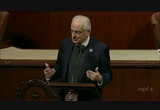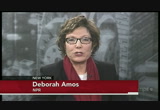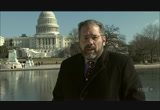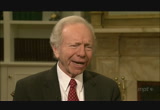tv Eyewitness News at 6 CBS January 4, 2013 6:00pm-7:00pm EST
6:00 pm
captioning sponsored by macneil/lehrer productions >> woodruff: employers added 155,000 new jobs in december, while the nation's unemployment rate remained unchanged at 7.8%. good evening. i'm judy woodruff. >> brown: and i'm jeffrey brown. on the newshour tonight, we have the latest on the final 2012 jobs report, and get a picture of the economic forecast in different regions of the country. >> woodruff: then, we talk to npr reporter deborah amos about the devastation in syria as the death toll in the two-year civil war climbs to over 60,000. >> brown: special correspondent john tulenko examines ohio's retention rule for schools-- finish third grade being able to read or be held back.
6:01 pm
>> up until third grade you're learning to read after third grade you're reading to learn. but if you aren't well equipped reading pro fish eptly at the end of third grade you will struggle throughout the rest of your school years >> woodruff: ray suarez looks at the firestorm of criticism leveled against some of the front runners for high-level jobs in a second obama administration. >> former senator hagel hasn't been officially nominated to become the next secretary of defense but that hasn't stopped his critics from going to war against the possible picks. >> brown: and mark shields and david brooks analyze the week's news. >> woodruff: that's all ahead on tonight's newshour. >> major funding for the pbs newshour has been provided by: >> bnsf railway. >> support also comes from carnegie corporation of new york, a foundation created to do what andrew carnegie called "real and permanent good." celebrating 100 years of philanthropy at carnegie.org.
6:02 pm
>> and with the ongoing support of these institutions and foundations. and friends of the newshour. and... >> this program was made possible by the corporation for public broadcasting. and by contributions to your pbs station from viewers like you. thank you. >> brown: 2012 ended with another month of steady but unspectacular job growth. that was the main takeaway from today's numbers out of the labor department. the weeks of will they or won't they go over the fiscal cliff in washington had raised fears that businesses would cut back hiring. instead, the december jobs report suggests that neither employers nor job seekers were rattled, but that there had also been no big pickup in job growth. the u.s. economy added 155,000
6:03 pm
jobs, slightly down from november, but in line with analysts' expectations. overall, an average of 153,000 jobs were added each month in 2012, roughly the same pace as the year before. and in a sign of growing confidence, more people entered the job market last month. >> 182,000 americans got into the labor force. that means that they went out there looking for jobs. that means people are getting more optimistic out in the streets. >> brown: one area where that optimism was justified is construction. it added 30,000 jobs, the best performance in 15 months. much of that was due to reconstruction from hurricane sandy. other bright spots were health care, which added another 55,000 workers; restaurants and bars, which gained 38,000 more employees; and manufacturing, with 25,000 new positions. alan krueger is chairman of the president's council of economic advisors. >> i think we're seeing the job market continuing to heal. the economy's continuing to heal
6:04 pm
from the very deep damage that was caused by the financial crisis. >> brown: even so, there were also indications of continued sluggishness in december. the unemployment rate was 7.8%. that's up a tenth from the initial reading in november, which was revised upward today. and the number of unemployed rose 164,000 to 12.2 million. that number rises to nearly 23 million once part-time workers and those who've given up looking for work are added in. most economists expect modest growth but little overall improvement this year, as the pace of job growth remains too low to make much of a dent in the unemployment rate. we get an economic snapshot of different regions of the country from three public broadcasting reporters: erik anderson is a business reporter and anchor on kpbs in san diego, california; cathy lewis is an anchor and host of her own show, "hear say," on whro in norfolk, virginia; and stan jastrzebski is news
6:05 pm
director for wfiu in bloomington, indiana. eric ander son, let's start out west with you. do the new numbers jive with what you are seeing in your area and in california? steady but not spectacular hiring? >>. >> that's exactly right. california has been tracking in that steady way. we've been seeing growth for now probably the past 18 months or so. but it hasn't been that spectacular growth. it's not that recovery growth. a lot of economists here are talking about the economy is showing good healthy signs and the job market is reflecting that. but it's not showing the kind of signs you need for the economy to recover completely. so your's not quite at a complete recovery but certainly the job market is pick up here. >> any particular sectors that you look at or point to. >> yeah, there are a couple out here, in fact. leisure and hospitality industry gained significantly. about 62,000 jobs there. construction picked up here not because of hurricane sandy on the west coast that's mostly i think due to
6:06 pm
the optimism in the business arena and the rebound in some of the housing market. and also the information industry has picked up about 26000 jobs here. >> and stand jastrzebski in bloomington, what do you see in your area? >> well, i think in bloomington and indiana generally what we may be seeing is sort of a delayed reaction. i've talked to some economist as that say maybe business owners were a little late to pick up on for instance, how bad the fiscal cliff could be for them. so there's a little bit of worry, i think, still here and the state is kind of now getting to the point where people are beginning to figure out what the fiscal cliff negotiations meant for them. and so the state's manufacturing sector, for instance, had been growing at three times the national rate. and now i guess we'll kind of watch and see where it goes going forward especially in such a manufacturing heavy state as this. >> brown: well, so how has that affected manufacturing and other sectors? or you are saying it is more of a wait-and-see at this moment? >> that's exactly right. wait and see is probably a
6:07 pm
very good way to put testimony. the slowdown has been felt here in inendment and in california. it's been slow and steady. but now here in end inwe need to see going into the first couple of months of 2013 where the numbers go from here. i think this is kind of potentially a little tipping point. and could we if we continue on in the way we've been going then i think well have gotten past the worries of the cliffment but i think it is too soon to tell. >> brown: cathy lewis we have talked to you in the past. really military area in norfolk. but give us a sense of overview of what you are seeing. >> sure while stan suggests there is a little worry in indiana, i can tell threw is a lot of worry here. that is especially true because the hampton roads region has rested comfortably between the state's unemployment rate and the national unemployment rate. but that could change pretty quickly here as a result of the delay of sequestration now to march 27th. in fact, just today one of the states leading
6:08 pm
economists christine chim ura told the virginia commerce that the state will definitely move into recession if sequestration occurs on march 27th and that will particularly be felt in the northern virginia region, the washington suburb and right here at hampton roads which has the largest military concentration in the country. >> brown: cathy, give us a little more of other industries. i don't know if you can set aside all this sequestration and uncertain over that. but where has things been headed in the past couple of months? >> i think things have been-- had been holding pretty steady in the region. this particular conversation conversation about the degree of dependence this community has on defense has really been brought into sharp relief in these last couple of months. i think there is a growing sense of awareness on the leaders here in this region the fact that one of every two dollars in the economy comes from defense is a challenging place to be on the brink of what may happen on march 27th. i talked with a c.e.o. that
6:09 pm
today who told mow that the fact of the matter is they are at what they are calling a nervous parade rest. there's very great concern because as the year moves on if the fiscal if the sequestration comes through, there will be a shorter period of time and so the cuts will be bigger and more painful. >> reporter: erik anderson in san diego, we hear so much about this uncertainty of the economy. and then uncertainty based on what is going on here in washington. what is your sense of how that plays out in the economy there? >> well just like in virginia there is a keen awareness about the uncertainty over federal funding here. sequestration hits the active duty military personnel that are stationed in san diego, big naval installations here marine installations. it hits defense contractors that are centered here in san diego. a lot of research and development goes on in this area and in the los angeles area. and it also hits the researchers who are working in life sciences who rely on
6:10 pm
federal funding for their research dollars as well. so there's a lot of concern because it reaches a lot of areas that really buoyed the area up during the economic downturn that kept the economic downturn from being as severe, which was the military and life sciences. >> brown: so your sense is people were watching carefully the fiscal cliff doings and even more so now we've been talking about on the program that this is going to continue for months. >> yeah it's really kind of seen as more of a swerve instead of carrevening over this fiscal cliff. people realize that you know, the vehicle is still moving and there is still the potential to have a serious impact in jobs and in dollars that come in and out of the san diego economy. so that has them worried as well. >> stan jastrzebski also thinking about what is going on in washington t that would be the federal reserve which has kept interest rates at close to zero for quite a long time now. can you tell whether that's having some impact in term its of businesses willing to
6:11 pm
invest or consumers willing to borrow? >> i think one of the consumer markets might be the housing sector which has been particularly positive in indianapolis and in indiana in general. new housing starts for all of 2012 were up in indiana. so people seem to be ready to take out those loans ready to get new houses built. but now we're hearing from mayors around the state who say that there is the opposite problem where even though the state's got a $2 billion surplus, we're looking at assessed values of homes going down. so the consumers buying the houses that are new are not the same obviouslies as pem who have the home and seeing the values go down as those values go down so does property tax revenue. so you have kind of a two-sided argument here. people are willing to invest themselves but when they invest, they're worried i think that their investment is going to poning potentially lose value over time pore quickly than it might otherwise. >> brown: cathy lewis, what about that interest rates and housing sector in
6:12 pm
particular. >> you know, it's an interesting time here because the prices are starting to come up a little bit. we are starting to see some more sales activity. but you have a lot of people who are sort of stuck for the moment. their houses are, they owe more than their houses are worth, this frequently happens with military families who have been transferred out of the area. so you have a lot of folks who have been in that situation, who are renting homes and can't afford necessarily to buy somewhere else. but things are moving and the real estate community is saying the prices are starting to come up and they're feeling more optimistic. >> brown: since we're at the beginning of the year cathy let me ask you first what are you looking for? i mean what sounds as though the most important things for your area is what happens here in washington. >> boy, is there no question about that. all eyes are on march 27th. i have to be honest and say i'm not hearing much enthusiasm about the prospects of coming up with a deal that will do away with the sequestration. there's great concern about that. because if managers are required to find this year
6:13 pm
dollars, about the only place they can do that is personnel and maintenance contracts, service items that sort of thing. so that means you're going to be hitting buildings and grounds folks personnel the very real prospect of furloughs and layoffs. you might have less steaming time, less aircraft hours. so there are a lot of small and midsized contractors that serve the defense industry who are very, very anxious. and i'm talking to folks who are saying they're anxious because the federal folks who are usually buying their services are sitting on the fence for the moment and won't do anything until after march 27th. >> brown: just a brief last word from you. what are you most focused on for 2013? >> well if you take the sequestration out of the equation and you look just at the economy as it is now i think what economists here are saying is most hopeful is the rebounding of the housing industry out here. they're starting to see activity in terms of prices the shadow inventory of
6:14 pm
distressed housing has shuningen quite a bit there are still a lot of people who are underwater on their mortgage os. but overall the supply is tight. there's buyer interest and there's hope that it will become an engine again for the region. >> brown: he-- erik anderson stan jastrzebski and cathy lewis, thank you all three. >> woodruff: online, find our monthly unemployment calculations on our "making sense" page, where we also look back at a year of labor data. still to come on the newshour: syria's unrelenting civil war; ohio's reading guarantee; derailing the president's potential nominees; and shields and brooks. but first, the other news of the day. here's hari sreenivasan. >> sreenivasan: the food and drug administration proposed the most far-reaching food safety rules in decades today. it's a response to outbreaks of food poisoning that kill 3,000 americans every year. under the new rules, farmers would have make sure that workers' hands are washed and animals stay out of fields. and food companies have to submit new safety plans.
6:15 pm
wall street managed some small gains to close out the week. the dow jones industrial average added 44 points to end at 13,435. the nasdaq rose one point to close at 3,101. the s&p 500 ended the day at 1,466, its best finish in five years. for the week, the dow gained nearly 4%; the nasdaq rose almost 5%. president obama's re-election is now official. the 538 electoral college votes were certified and tallied today in a joint session of congress. the president won 332 votes, far more than needed. republican mitt romney was awarded 206. the president also won just over 51% of the popular vote, according to final counts. he's the first since eisenhower to achieve that mark in both his runs for the white house. the house voted today to approve more than $9 billion for flood insurance claims from hurricane sandy. the senate quickly followed suit. the house vote came just days after speaker john boehner
6:16 pm
delayed a vote on a larger aid bill worth $60 billion. that decision sparked an outcry from northeastern republicans. congressman peter king of new york argued today the funds are urgently needed for thousands who lost their homes. >> people are suffering. people are suffering and sufferingly increasing each day. i want to emphasize that this legislation is vital this is thought a handout this is not something we are looking for as a favor. what we are asking for is to be treateds same as victims in all other storms all other natural disasters have been treated >> sreenivasan: others in the republican ranks called for approving aid in installments and cutting spending elsewhere to offset the cost. but democrats like congressman bill pascrell of new jersey said there has to be action now. >> this is a total disaster in helping those people that we are purposefully saying today in pontificating about we're helping them. isn't that wonderful what's our jobs. we're to the doing anybody any favors. that's why we were sent
6:17 pm
here. try it once in a whiling dem october see. you may like it >> sreenivasan: the house will vote on january 15 on an additional $51 billion in recovery aid. a former congresswoman who survived a mass shooting, gabrielle giffords, visited newtown, connecticut, today. it was three weeks to the day since the massacre at sandy hook elementary school. giffords met with town officials, then with families of the victims. the arizona democrat was shot in the head two years ago. six people were killed in the attack. a pakistani teenager has been released from a british hospital three months after the taliban tried to kill her for advocating education for girls. 15-year-old malala yousufzai was airlifted there after being shot in the head in october in pakistan's swat valley. today, the hospital in birmingham, england, released video and photographs of malala waving to the staff and hugging her nurses as she left on thursday. for now, she'll stay in britain with her family, and next month, she'll have skull reconstruction surgery. hundreds of thousands of palestinians rallied in gaza
6:18 pm
today in a rare show of support of the fatah movement there. the yellow flags of fatah were seen waving all over gaza in large squares, in processions and from rooftops. it was the first such event since the rival group hamas seized power in gaza in 2007. hamas approved today's rally, and its prime minister voiced hopes for reconciling differences over how to deal with israel. those are some of the day's major stories. now, back to judy. >> woodruff: the war in syria reached another grim milestone this week. the united nations estimated that the death toll from the almost two-year long conflict has reached more than 60,000. ray suarez has our report. >> suarez: a pro-government tv station in damascus played a patriotic dirge today over video from an early-morning car bombing in a mainly sunni neighborhood. the blast killed at least 11 people, and wounded many more, as they stood in line at a gas station. a similar explosion on wednesday killed 30.
6:19 pm
the government blamed "terrorists," its term for the rebels. the opposition claimed the assad regime planted the bomb in a disputed neighborhood. elsewhere in the capital, syrian air force fighter-bombers streaked overhead. as day broke, one dropped its payload on the northeastern suburb of douma. it was all evidence of the escalating fight for damascus. the rebels now hold suburbs on the southern and eastern outskirts of the city. and to the north, a rebel assault on a key government airbase in idlib province continued today. that attack is being led, in part, by jabhat al nusra, an al qaeda-linked militant group that the u.s. has declared a terrorist organization. and amid the combat this week came a grim updating of the carnage. >> the u.n. high commissioner for human rights, navi pillay, said that, as there has been no
6:20 pm
let-up in the conflict since the end of november, we can assume that more than 60,000 people have been killed by the beginning of this year, 2013. she said that the number of casualties is much higher than expected. >> suarez: in a bid to keep the killing from crossing the turkish border, american soldiers in street clothes arrived at gaziantep in southern turkey. they'll help deploy nato patriot missile batteries. for more on this i'm joined by npr's deborah amos. she's crossed into syria many times during the two-year long conflict, and is covering the conflict and its casualties closely. well, deborah, we were just reporting on the rebels inching closer to the capitol dam-- damascus. has the momentum changed in favor of the anti-assad force sfs. >> it seems now that we are in a stalemate. the fighting has really not moved. at the moment the regime
6:21 pm
still control can every major city in the country. and the rebels have not been able to change that balance. i think the focus of the fighting now is around two major airbases. the regime still controls the air. the rebels control most of the rural areas in the country, and two major cities are now in dispute. but the lines really haven't moved over the last couple of months. >> suarez: the anti-u.s. tone of the rebels is interesting. it em sos like it's been intensified even as the united states talks about delivering nonlethal aid to both civilians and the fighters themselves. how do you explain that? >> i think that there was some expectation when the opposition reformed itself into a new group. when the military, the rebels reformed themselves into a more coherent group. that that would somehow pay off for them.
6:22 pm
that there would be some more weapons delivered maybe some pore aid that will come directly through the opposition movement to bolster their position inside the country. so far that hasn't happened. and that's been particularly a bitter pill for the rebels to swallow. in fact when i left istanbul many of the rebel commanders were complaining that the arms had actually slowed down to almost a full stop. and what they are fighting with is what they can amass by taking over military bases inside syria. they are depending on themselves. they had expected more support, after they did what the international community asked them to do which is come together in more coherent groups. >> suarez: as weapons percolate into rebel hands they seem to be held by the most radicallized, the most islamist of all the fighters. how is that happening? is it out of ideology or just because these guys know
6:23 pm
how to fight? >> well, that is true, ray these guys do know how to fight. they have been the best fight evers on the battlefield. and so when a rebel group takes over a military base it's often-- who is at the forefront of that fight. and they collect the spoils. so their success builds on success. and when the u.s. designated them as a terrorist group, in fact they got more recruits. and more anger was building in syria because their argument is wait a minute these are the guys that are delivering us from the regime. and many syrians say you know, we sleep with the devil. if you can stop the air force from bombing our city. and so the popularity of el nice tro front has already grown. >> with all that you have just said some of syria's most recent traditional allies are very much on the side of the regime. so when the smoke clears, if a saad goes-- assad goes
6:24 pm
where does syria go not into the arms of reasona right, or iran? >> i think that if the regime goes that is precisely right that the old alliances simply are no longer workable. but i think we really don't know who will rule syria if the regime goes. and what you are seeing now i think, is that the natural community is desperate for a negotiated settlement. and so in part the explanation for the slowdown in the weapons is that nobody on the outside wants a military victory inside syria. they want the rebels to be able to pressure the regime to come to a negotiated settlement. because the international community is worried that if the regime collapses, there will be chaos inside syria. it's a very difficult balance to maintain. because when the regime feels strong assad says i will stay. when the rebels feel strong they don't want to negotiate. so how you bring all of
6:25 pm
these interested parties to a negotiating table, we are nowhere close to that moment. >> and nowhere close to a resolution from very briefly from everything that you have said it sounds like this still has a lot of chapters to learn. >> yes, i'm afraid that that is true. and we could be in for a very brutal long stretch. over the past couple of days the regime has stepped up its air campaign. there has been some significant bombings in the rural areas in the north. and we have now reached a an amazing death count 5,000 people a month since july have died. and those are mostly civilians. we really don't know the amount of death in either the rebel group or in the regime military. neither one of them are publishing their death counts. so when you hear 60,000 people have died since the beginning of this uprising 90% of that in 2012 we are
6:26 pm
talking about civilians. and there is as everybody says, no end in sight. >> npr's deborah amos thanks for joining us. >> thank you very much. >> brown: next, a controversial stance in education, a guarantee that all students leaving third grade are able to read, and a commitment to hold back those who can't. 14 states have adopted these so-called "retention" rules with others considering such legislation this year. special correspondent john tulenko of "learning matters" reports from ohio. >> you're going to like the way you look, i guarantee it. >> reporter: the travelocity guarantee. >> the chevy love it or return it guarantee. >> reporter: lots of products come with guarantees. >> you're to the going to pay a lot. >> i guarantee it. >> reporter: what if schools could make guarantees too? in ohio they do.
6:27 pm
new legislation guarantees that all third graders will read at grade level by the end of the year. right now 30%, some 40,000 students are not. linda teaches third grade in cincinnati. >> i have some students who are at a kindergarten level reading first grade level reading, second grade. i look at it with dismay. >> reporter: she is no fan of promoting children before they're ready. she first saw the effects when she taught fifth grade. >> their whole day is made harder because all of our texts are based upon a fifth grade reading speed. math class is harder because you're having word problems. science, social studies so for them to be sitting in a class that is too hard for them, it's making their education more of a challenge and an obstacle. >> reporter: ohio's remedy? hold those students back. a third grader who cannot read by the end of the year will not move on. >> the third grade reading
6:28 pm
guarantee is going to be very heart of education and that is ability to read. >> state senator peggy lainer introduced the guarantee. >> up until third grade you're learning to read. after third grade you're reading to learn. but if you aren't well equipped reading proficiently at the end of the third grade you're going to struggle throughout the rest of your school years. >> reporter: holding the line at third grade is catching on. 14 states have adopted retention policies. six since 2010. >> but it's controversial. studies suggest repeating a grade doesn't pay off. it may actually result in higher dropout rates down the line. potentially devastating news for disadvantaged minority students. they're already five times as likely to be held back. still for states fed up with schools that fail to teach students to read, tough love approaches like ohio's are just about guaranteed to deliver a powerful message.
6:29 pm
>> the first that came out of everybody's mouth was oh my god, okay, how are we going to do this. >> reporter: the promise to hold students back has put enormous pressure on principleses like ruthie jackson of carson elementary in cincinnati. >> the third grade guarantee. it's the buzzword for the whole school and also the whole district. that's all we are going to be talking about this year. >> reporter: roughly half her students in grade k through three read below grade level. >> we've got to buckle down and they've got to read. there is no ifs ands or buts about telephone. >> i will say the word and you say the sounds in the word. >> reporter: right away carson and most other schools rushed out and hired reading specialists. they've been scrambling to test every student in grades k through three. >> we're taking it extremely seriously. i mean it is urgent. >> song. >> the most severe cases we need to back way up. and teach them their basic sounds and things like that. >> reporter: to provide more one-on-one help the school is asking classroom teachers
6:30 pm
to tutor struggling readers. high school volunteers have been recruited as well. but all these efforts may not be enough. >> can you guarantee that all your third graders will be reading at the end of the year. >> no, i cannot guarantee that. i really can't. >> reporter: how comfortable are you giving us a guarantee that the kids will be reading at the end of the year. >> i'm somewhat confident. >> reporter: somewhat is not a guarantee. >> i have a lot of different strategies that i use to help a child learn to read. there is issues though, like absenteeism. a child never being exposed to print. a child who only comes to school maybe 20 days in kindergarten 20 days in first grade and then come to me in the second grate. i think teachers in general have so many uncontrollable issues. >> reporter: adding to the challenge is a shortage of seats in preschool. it's been proven to lay the foundation for reading. but ohio only provides free
6:31 pm
preschool for about 6000 children. leaving an estimated 20,000 others without. back in third grade students needing help may have to wait in line to see the new reading specialists in many schools there is one for hundreds of students. >> i did the math. and the reading specialists can meet with each child individually once every 18 days. >> not enough. absolutely not enough. >> reporter: for some students, the reading guarantee has had harmful consequences. last year when six and seven-year-old cayleea and kian williams of cincinnati were struggling in school a district isn't a tutor to their home twice a week for two hour session. >> the tutor she taught with fun excitement, joy. >> the grandparents are raising the girls. >> i noticed that they started liking it, to go to school. they started asking for the homework. they wanted to do the homework. it was a challenge. and they went for it.
6:32 pm
>> reporter: but with the guarantee came problems for the girls. >> backed by 13 million dollars in the state about 6,000 per school the guarantee wouldn't begin to cover salaries for reading specialists. the state found the funds by eliminating tutoring for the william its girls and thousands of other students. >> and i said you can't be real. if i could afford it myself i would have paid for it. because i thought it was a big help. >> one of the concerns we have is that not all of that tutoring the people are receiving has been beneficial. >> reporter: following a recommendation from ohio's department of education senator laner supported repurposing the tutoring fund. but she says it's a mistake to think that's all the money the schools will need to meet the guarantee. >> i'm hoping that we can put some additional money in. >> reporter: how much is it going to take? >> i think frankly we might be looking at 60 60 million dollars. >> reporter: she also
6:33 pm
acknowledges educators' other concerns about the reading guarantee. lack of preschool an parents who don't do their part. >> there are so many questions around that. >> sure. >> reporter: do you ever feel like you are stepping out on a limb on this one? >> it is a risk. and i think we have to take a risk. we have to change what we are doing because what we have been doing is not working. >> you give us a guarantee that this will work. >> of course not of course not. one thing does appear guaranteed. for better or was children will be held back. >> the research shows that if you retain children it does not help them down the line because you just, they are just getting older. and then eventually they will get in high school and just drop out. who wants to be 17 in ninth grade. nobody. i understand that. and i certainly fear it the flip side of that, however is we also know that children who are not reading proficiently in third grade are four times pore like -- -- more likely to be drop out in high school.
6:34 pm
>> reporter: evidence that holding those students back pay be the answer comes from a recent study in florida where a third grade guarantee has been in place for years. >> what they have seen there have been significant improvements academically in those, in the children who were retained from their peers who moved on. and that has helped for up to five years. >> but florida spends heavily on interventions including summer school. ohio hasn't. betting the threat of holding students back will won't be enough to guarantee that all third graders will learn to read. a number of nis organization reported that president obama will follow nature chuck hagel to be secretary of defense next week. but there was no official confirmation from the white house. this latest news caps
6:35 pm
several weeks of a public campaign for and against hagel's nomination. ray is back with this story. >> hagel says military action is not a viable, feasible responsible option. president obama-- for secretary of defense, chuck hagel is not a responsible option. >> suarez: former nebraska senator chuck hagel has not, so far, been nominated for the top pentagon job, but attacks like this tv ad began shortly after news accounts named hagel the frontrunner. they focus mostly on whether he's sufficiently pro-israel. >> there is an incredible level of concern about the kind of secretary of defense he would be, based on his foreign policy views and his foreign policy record, and the things he's said over the past dozen years of his political career. >> suarez: noah pollak is executive director of the emergency committee for israel, which produced the tv ad. under federal law, the committee does not have to disclose the sources of its funding, but it's one of several pro-israel groups opposing hagel. >> you take an issue like iran,
6:36 pm
which is probably the most important national security threat and problem we will have to deal with in the coming few years. and chuck hagel has come out and said that he's against... he thinks military strikes are not a viable military option. he's even come out against sanctions. and you have to wonder what kind of advice would he give to the president. >> suarez: hagel has also taken fire from gay rights advocates in his own party. in last thursday's "new york times," the log cabin republicans posted a full page ad that read: "chuck hagel: wrong on gay rights, wrong on iran, wrong on israel." the ad included remarks he made in 1998, calling an ambassadorial nominee "openly, aggressively gay." the diplomat in question, ambassador james hormel, has accepted hagel's apology; log cabin republicans have not. last sunday, president obama was asked about the remarks on nbc's "meet the press". >> he apologized for it, and i think it's a testimony to what has been a positive change over
6:37 pm
the last decade in terms of people's attitudes about gays and lesbians serving our country. and that's something that i'm very proud to have led and i think that anybody who serves in my administration understands my attitude and position on those issues. >> suarez: indeed, hagel already serves this administration. he's co-chaired the president's intelligence advisory board since 2009, after he left the senate. in his sunday interview, the president called hagel a patriot, but he also said there's been no decision on a nominee. this is the second time in recent weeks that a potential high-level obama administration nominee has come under fire. last month, united nations ambassador susan rice withdrew her name as a potential nominee for secretary of state. she'd come under fierce republican criticism over public statements she made about the attack on the u.s. consulate in benghazi, libya.
6:38 pm
hagel has run into stiff opposition from senate republicans. he alienated many of them when, as a senator, he criticized the iraq war after voting for it, initially. >> we're beyond disarray. we're beyond division. we've got anarchy and very clearly defined tribal sectarian civil war in iraq. that's happening right now. but, most important, those men and women that we ask to fight and die, they deserve a policy worthy of their sacrifices. they, in my opinion, do not have that policy today. >> suarez: on "fox news sunday" last weekend, south carolina senator lindsey graham made clear that republicans have not forgotten or forgiven. >> i can tell you there would be very little republican support for his nomination. at the end of the day, there will be very few votes. >> suarez: meanwhile a group of republican and democratic officials have written to the president, expressing their support for hagel, and they're mounting a campaign with radio ads. >> i've know him since his early
6:39 pm
days in the senate. we have consulted and talked often about foreign policy. >> suarez: former ambassador thomas pickering is one of hagel's supporters. over a long career, he's gone through the confirmation process nine times. does this process that happens before a nomination and before a hearing get you better nominees, get you better confirmed cabinet members, get you a better government? >> would the pre-confirmation process as its now unrolling with all of its panoply, be a good thing? i'd say no. i think that, in effect, if we could find a way to avoid it. and i'm realistic enough, i've spent enough time in this town to know that that would be hard. >> suarez: dov zakheim served as undersecretary of defense comptroller during the george w. bush administration. he is not part of the campaign to save hagel's potential nomination. he says claims that hagel is anti-israel are unfounded.
6:40 pm
>> he voted on some things that upset some pro-israeli folks, no question. but you look at the record, it's pretty much overwhelmingly pro- israel. and with only 6,000 jewish votes in nebraska, and i don't know how many evangelicals, it's not a critical issue for him in that respect. if he voted for israel, it's because he felt it was the right thing to do. he's a man of integrity. he does what he thinks is right. is he anti-israel? absolutely not. there is not a shred of evidence of that. >> suarez: still, zakheim acknowledges the road to senate confirmation won't be an easy one for hagel, if he is nominated. >> he would have to convince senate republicans in particular, and republicans on the hill in general, that whatever he may have said in the past it's not what he feels now. >> there are real questions to be raised. >> suarez: retiring senator joe lieberman also hinted at a potentially difficult confirmation process in a recent interview with "the newshour." >> i wouldn't say that i'm opposed to chuck hagel as defense secretary. of course i'm not going to be here if he's nominated to consider his nomination. but if i were here and on the
6:41 pm
armed services committee still, i'd have a bunch of questions to ask and want to have answered before i could say i support his nomination. >> suarez: in the meantime other names have surfaced as potential nominees, including deputy secretary of defense ashton carter, and michelle flournoy, a former undersecretary of defense. for now, the man who will make the final decision on a nominee remains on vacation in hawaii. >> woodruff: and to the analysis of shields and brooks. that's syndicated columnist mark shields and "new york times" columnist david brooks. welcome, gentlemen. so before we talk about this process of what's happening here assuming these news reports today are right mark and it is going to be chuck hagel the president nominates for defense, good choice or no? >> i think chuck haig el comes with enormous strength for this position at this time. first of all i mean the question is always raised
6:42 pm
you know is anybody able to run the defense department he was a co-founder of the vanguard cellular system ran as c.e.o. of uso worldwide. but nobody leon panetta who has been a great secretary of defense or certainly an outstanding secretary of defense, had no similar background. but i think what chuck hagel brings to the administration in addition to his great credibility from his own military experience in combat, where he saved his brother's life and his brother saved him after he requested to go to vietnam with orders he enlisted in the army chuck hagel with orders to germany instead insisted on going to vietnam. he said that there he vowed that he would make sure the united states did to the go into wars without thought reflection and all the elements to it. and that has been the hallmark of his for own policy.
6:43 pm
it's always dangerous judy in this town to be right on matters in which the established authorities are wrong. and if the established authorities are absolutely wrong about the nuclear capable and capacity of iraq. chuck hagel raised red flags about that at the timement even though de vote for the war. he publicly went on. and so i think there are questions about himment but he's a republican. a bipartisanship. it brings i think credibility. i just think there is a lot of strength and plus he's an interesting and thoughtful man. >> a lot of strength. >> i more or less agree with that. first on three subjects. first his integrity. i spent a lot of time with him during the iraq war and i didn't agree with where he was going but he fold his conscience, the evidence and the hardest thing one of the very hard things which is to be unpopular in his workplace. he was extremely unpopular with republicans and democrats because he was going on his own course. i thought he showed great courage and integrity even
6:44 pm
though i may have disagreed with him. on the substance he's a realist. more or less his views are similar to colin powells, i would say. i think that puts him very much in the part of the foreign policy establishment. the idea that he is beyond the bounds on israel or any other subject is not true. he's a realist. he may not agree with you if you want to do more humanitarian interventions the way susan rice actually would have. but the cautious use of power but a pretty muscular use of power. as for the management that is the open question. he did run a business. but we have had two great managers, o bob gates and leon panetta managing the pentagon. this will be a time to require incredible management skills because it means reducing the pentagon budget while cutting things that should be cut and not being outfoxed by all the people who are going to want to keep programs on the hill and within the building. >> woodruff: how do you explain the big campaign against him and the second in a row after susan rice? >> well, part of the realism is less of a more of an idea logical commitment to israel
6:45 pm
and more of an effort to rebalance our position in the middle eastment i think there is some genuine element to that. i do think he is part of that he has been part of some organizations that have run articles you know about the israel lobby that have talked about an apartheid israel. so he has been associated with some people who said some reasonably inflammable things. that's not to say he believes all that i think that is at the heart of all this i do think it will be hard to get him confirmed because the republicans including graham aren't there he is a republican so a lot of democrats are not quite there either. >> it's got incredibly widespread support. bipartisan support. i mean just in the national security field. frank car luchi who is the national security advisor to president reagan frank scowcroft to president bush 41 and gerald ford national security advisor. jimmy carter's national security advisor great
6:46 pm
security scholar and general jim jones who was barack obama. i mean it is across-the-board t is paul volker tom pickering it is really a widespreadment i do think that there is some people, he wear those man's collar. chuck hagel is not someone who is absolutely predictable. he going to be with you 99% of the time and say what you want. and i think there are some people who view any criticism of whatever the administration is and could is somehow disloyal to the state of israel. if you stay with the labor party in israel says about benjamin netanyahu in this yes you make yourself vulnerable to charges of anti-sellphism in some quarters. >> woodruff: if there was a fight over-- if there is a fight coming over chuck hagel there would be a bigger fight for the last week months david over the fiscal cliff. and whatever it has been called since we first heard about it. is the country better off because of what this
6:47 pm
congress passed finally on new year's day the day after new years? >> i think we are immeasurably worse off. i think it was a complete failure. what do we want out of this. the president wanted a balance deal with tax increases and spending cuts. we did not get a balanced deal. there were no real spending cuts. second we could have done something to address our long-term debt. that was the whole purpose behind this whole thing. we did nothing to address our long-term debt. and almost nothing to reduce deficits over the next ten years. we could have had a stimulus package to have short-term economic growth which was talked about. we did nothing to do that. we did nothing to help reform entitlements. we could have put these endless budget fights behind us so we could get on to talk about immigration. we didn't do that either. we're going to have a sequestration fight, a debt ceiling fight. we're going to spend the next months at least having these fights again and again and again. so this deal to me fails on every single front. and leaves us worse off.
6:48 pm
>> woodruff: are you that negative about it. >> no, i mean i feel like poly go lightly compared to david, you know i'm just, listen to him i'm ready to slit my wrist force goodness sakes. i don't think it was-- when both sides basically admit seemingly that they lost, it is probably not a great victory for anybody. the president insisted on going in. there had to be 1.6 trillion in new revenues. john boehner at 800 billion. and they go to00 billion. that's not exactly a great triumph. >> woodruff: who's responsible. >> whose's responsible. judy, i mean we have, bob dole was a great man and a great-- said on capitol hill we love to make tough speeches but we don't love to make tough choices. the fact is that the american people who want all the benefits and want the free lunch, and don't want a
6:49 pm
single gray hair on the beautiful head of social security or medicare touched and basically don't don't want to pay for t i mean the old line is we elect republicans because we don't want to pay for it and elect democrats because we want everything the country is going to give them it say terrible conundrum and dilemma. we looked in the mirror to see whose fault there is. i would say there is lack of leadership as far as sacrifice across-the-board. >> the white house. >> the white house, to the congress to our national leadership to us in the press as well, i guess to spell out. look, we want people to be covered. we want people to have the coverage there are some of us who can afford coverage. and we're still getting medicare and social security. >> yes exactly. and we're to the going to have enough money to provide that coverage for everybody. and we do want to provide it for those who need it most. >> i completely agree. we blame politics always say washington is dysfunctional. they're responding
6:50 pm
reasonably he fish enly to what the american people want which is to take the future money and spend it on ourselves. so what we are looking at the next generation according to the imf is going to have one-third fewer benefits and one-third higher taxes if we wait now, if we wait it will be 50% more tax fewer benefits t is terrible for the future generation so it starts with the american people. nonetheless i do blame everyone else too, including us i guess. but i would blame the republicans for saying they want to control spending talking of beating their chest about it but they don't have a strategy because they don't have the guts to propose spending cuts so they talk about the debt for years and years. they finally have a chance to propose some actual reform. they can't do it because they think it would be unpopular. and then to criticize to the president i think cohave given a speech laying out exactly where we are as a country, rally public opinion. they need to do something. and for democrats i would say you want to protect
6:51 pm
valuable programs head start early childhood medicare is basically eating away at all that. >> uh-huh. >> if you don't tackle medicare you will have less for all the stuff you want to do. so who do i care more b the rich edmontonerly or poor young. >> it's interesting you both are saying this because so much of the criticism has been directed at the speaker of the house john boehner struggling with his republican caucus. >> yeah. >> so with that criticism deserved? >> no, john boehner john boehner tried to do a political thing which was to try to preempt the president and the democrats with his plan b which was to raise taxes on millionaires. and not on-- and he couldn't get the votes out of his own caucus to do it. so at that point i mean 50 people in that caucus judy, who basically will not go for anything. and they proved it when the fiscal cliff bill came before the house and it had to be passed. so i mean john boehner then
6:52 pm
found himself rolled over to the senate. he had no choice and he's got a real restive constituency in that republican house caucus. he came within three votes of not being re-elected as speaker. members sat on the floor and didn't vote. i mean you know so he's in a very precarious position. i don't know why he wants to be speaker at this point. given the difficulty of the job and the precariousness of his position. i mean i think he's a very able legislator. i think he believes in the legislative process and i think he is a grown-up. but boy, he's got a tough row ahead of him. >> january 4th in less than a minute what are the two of you looking for from washington in the weeks and months to dom. >> well, if we didn't do anything serious about the fiscal stuff, i hate to be gloomy guess here this time in march when we do this over again i don't see why it will be much diferm. i'm optimistic. the economy is beginning to come back but i look for a
6:53 pm
bad year and i'm not sure we will get to the serious stuff like immigration. >> i think we may get to immigration. and maybe even guns. because they don't have air price tag on them. but we had mile os bloin do a wonderful piece about the sewers of detroit. how are we ever going to fix them. how are we going to fix bridges, how are we going to educate children or do research. i mean there is no money to do it judy. we won't tax the middle class to provide it. and we won't cut other programs that are eating up all the funds. >> we're glad of two you are here to help us understand it all. >> and to cheer you up. >> woodruff: cheer us up. happy new year. mark shields david brooks thank you. and and mark and david keep up the talk on the "doubleheader," recorded in our newsroom. that will be posted at the top of the rundown later tonight. >> brown: again, the major developments of the day: u.s. employers added another
6:54 pm
155,000 jobs in december, but the unemployment rate stayed at 7.8%. the food and drug administration proposed the most far-reaching food safety rules in decades. and congress approved the first installment of aid for the victims of hurricane sandy. online, we look at how u.s. arts institutions are embracing digital technologies. hari sreenivasan explains. >> sreenivasan: have you ever live-tweeted during an opera? a study by the pew research center looks at the new ways in which cultural organizations are enriching their programs with technology and social media. jeff has that conversation on "art beat." how do you evict hundreds of vultures from living in the trees in your yard? according to the department of agriculture, with noisemakers and fireworks. see the story on our "science" page. and on tonight's "need to know," "the long view" focuses on the long-term care of the elderly and the hard choices families have to make. "need to know" airs tonight on most pbs stations. all that and more is on our web site, newshour.pbs.org. judy.
6:55 pm
>> woodruff: and that's the newshour for tonight. on monday, we'll look at the hefty price tag for all the pomp and glitter surrounding the presidential inauguration. i'm judy woodruff. >> brown: and i'm jeffrey brown. "washington week" can be seen later this evening on most pbs stations. we'll see you online and again here monday evening. have a nice weekend. thanks for joining us. good night. >> major funding for the pbs newshour has been provided by: ♪ ♪ ♪ ♪ ♪ ♪ ♪ ♪ moving our economy for 160 years. bnsf, the engine that connects us.
6:56 pm
>> and by the bill and melinda gates foundation. dedicated to the idea that all people deserve the chance to live a healthy, productive life. >> and with the ongoing support of these institutions and foundations. and... >> this program was made possible by the corporation for public broadcasting. and by contributions to your pbs station from viewers like you. thank you. captioning sponsored by macneil/lehrer productions captioned by media access group at wgbh access.wgbh.org
115 Views
IN COLLECTIONS
WJZ (CBS) Television Archive
Television Archive  Television Archive News Search Service
Television Archive News Search Service 
Uploaded by TV Archive on

 Live Music Archive
Live Music Archive Librivox Free Audio
Librivox Free Audio Metropolitan Museum
Metropolitan Museum Cleveland Museum of Art
Cleveland Museum of Art Internet Arcade
Internet Arcade Console Living Room
Console Living Room Books to Borrow
Books to Borrow Open Library
Open Library TV News
TV News Understanding 9/11
Understanding 9/11


























































